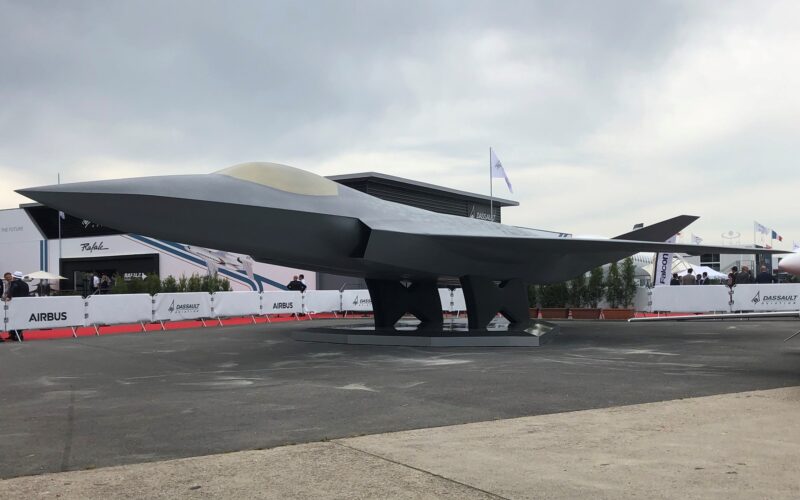Ahead of the Paris Air Show 2023, Olivier Andriès, the CEO of the French group Safran, has publicly expressed his support for Belgium’s participation in the Future Combat Air System, or FCAS, program.
This announcement comes in direct contrast to the stance taken by his other French counterpart in the program, Eric Trappier, Chairman and Chief Executive Officer of Dassault Aviation.
In an interview published by the newspaper L’Écho on June 15, 2023, Andriès reacted to the wish of Belgian Defense Minister Ludivine Dedonder to join the FCAS: “It is totally logical that Belgium wishes to join one of the major European programs for combat aircraft of the future. And obviously, my wish is for Belgium to join FCAS rather than Tempest [a competing European fighter program involving the United Kingdom, Italy and Sweden – ed. note].”
Dissension among the French players of the FCAS program?
During a hearing before the French Senate on May 24, 2023, Eric Trappier, the CEO of Dassault Aviation, expressed his opposition to European countries that have chosen to adopt the US-made F-35 fighter aircraft, particularly Belgium, joining the FCAS program.
“Under these conditions, I suggest creating an F-35 club within the SCAF project,” Trappier said. “I think we have to stick to what we committed to, which is already not easy. We have to do phase 1B with three countries. I hope that we will continue with phase 2, which will make it possible to fly the future plane, also with three countries. […] The discussions will be longer if we want to expand cooperation.”
But for Andriès, the F-35, and the NGF [Next Generation Fighter, the fifth-generation fighter jet developed within the FCAS – ed. Note] are not mutually exclusive.
“Belgium has bought F-35s as part of the missions assigned to it within the framework of NATO,” Andriès pointed out. “We must be consistent. Germany has also bought F-35s and we agree to collaborate with it.”
The thorn of NATO nuclear sharing
Both Belgium and Germany are part of an arrangement known as NATO nuclear sharing. Negotiated secretly during the Cold War, it was meant to ensure a quicker response to any nuclear threat coming from the Soviet Union.
Hundreds of US B61 nuclear gravity bombs are stored in several bases across Europe, namely in Belgium, Germany, Italy, Netherlands, as well as in Turkey. Participating member states must maintain a combat aircraft able to operate the B61s stockpiled on their soil.
Save for Turkey, which was excluded from the Joint Strike Fighter program, all participants of NATO nuclear sharing have placed orders for the Lockheed Martin F-35 fifth-generation fighter jet. The aircraft is currently undergoing certification by the United States Air Force for it to use the B61. It completed the final flight test in October 2021.
It is worth pointing out, however, that Germany did not have any F-35 aircraft on order when the FCAS program was initiated in 2020. The decision of the Federal Ministry of Defense was announced on March 14, 2022.
Ultimately a political decision
Andriès emphasized that the final decision rests with the governments of France, Germany and Spain, who are currently participating in the FCAS program.
“This is a decision that falls to the governments, not the industrialists,” Andriès said. “Therefore, if Belgium makes a sovereign and entirely respectable choice to join the SCAF program instead of the Tempest [a competing European fighter program involving the United Kingdom, Italy and Sweden – ed. note], I would wholeheartedly welcome it as a French industrialist.”
Defined by its stakeholders as a ‘system of systems’ built around a sixth-generation fighter jet, the FCAS program is composed of several subprograms, or ‘pillars’, which had to be distributed among manufacturers. This distribution process put the project into an almost year-long stalemate, with governments and manufacturers debating over conflicting industrial interests.
Dassault and Airbus reached an agreement on the Future Combat Air System program on December 1, 2022. Following the agreement reached between the manufacturers, the French Directorate General of Armaments (DGA) has announced details of the contract for the next phase, 1B, of the FCAS project.
It has been awarded to Dassault Aviation, the German and Spanish branches of Airbus Defense and Space, Indra and EUMET, a joint venture between Safran Aircraft Engines and MTU Aero Engines.

